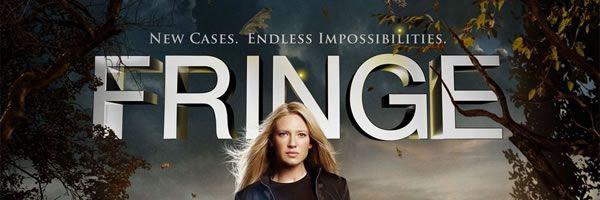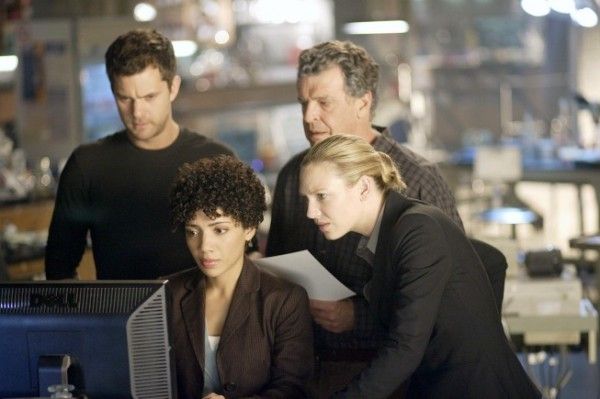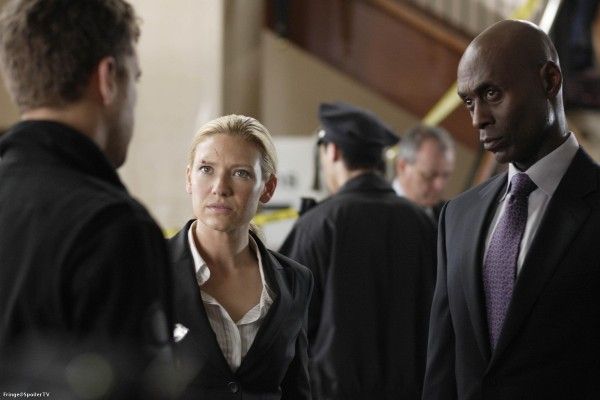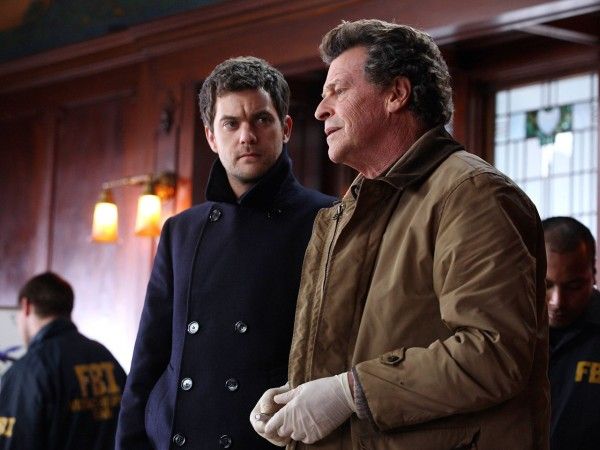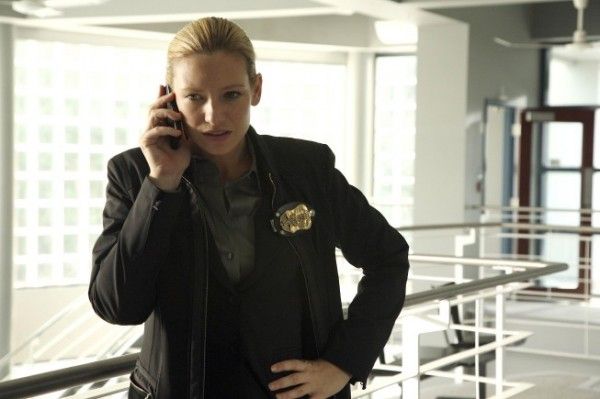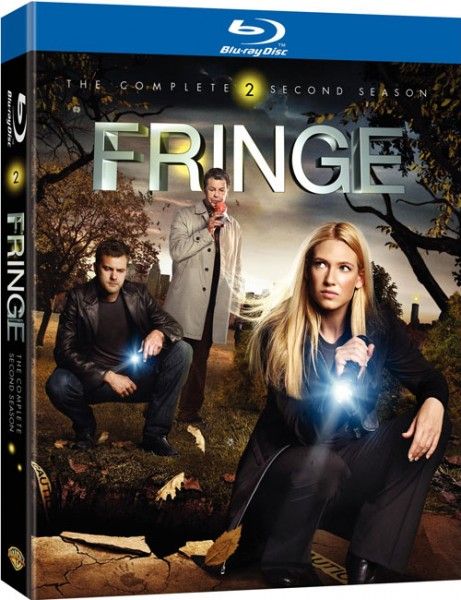After almost giving up on JJ Abrams' Fringe after a borderline-mundane first season, I sat down with season two of the series to see if it had improved. There wasn't anything wrong with season one, per se, it just didn't make me feel like I was missing out on much when I didn't bother DVR'ing season two. I'm happy to report, then, that not only does Fringe improve in season two, it nearly becomes a completely different show. Full review's after the jump, folks.
First, I should say this: Because Fringe is in its third season-- in other words: because you've probably already decided whether or not you're a fan of this series-- I'm going to assume that the people reading this review already have a working knowledge of the show's plotline and characters (as well as the twists and turns that occurred during the show's first two seasons). If you've never seen an episode of Fringe, don't know whether or not you'd like the series, and have decided to let this review make the decision for you: Yes, watch Fringe, but be aware that season one takes its time getting to where it needs to go in order to be a fully-functioning, bad-ass sci-fi/mystery series. But stop reading this review now; you may end up spoiling some of the show's better twists for yourself.
Now that we're all where we need to be: Good God, does Fringe get better in season two. I picked up season one on Blu-ray before I'd ever seen an episode of the series-- based on a recommendation from a similarly geeky friend of mine-- only to discover that the vast majority of Fringe's first season was spent performing what felt like a very elaborate cover version of The X-Files: there's the FBI team that's investigating strange occurrences, the otherworldly supporting characters with mysterious names, the sexual tension between the two lead investigators-- it was all there, but despite its best efforts, a knockoff was still a knockoff. At the very end of season one, it became clear that there was much more to Fringe than season one had let on, and so I decided to give the show a stay of execution in my household: I'd give season two a shot, and if it could deliver on the promise of the first season's finale, well, then we might be onto something.
And, y'know what? That's precisely what happened. After spending the majority of season one establishing the characters and finding the right tone for the series (or, if you wanna be cynical about it: after learning that people didn't want another X-Files knockoff), JJ Abrams, Alex Kurtzman, and Roberto Orci transformed Fringe into the best show of its kind since, yes, The X-Files. Believe me, if you watched a handful of episodes from season one and decided that this show wasn't lighting your fire, you need to give it another shot: In season two, Fringe becomes a completely different animal, and it's lightyears better than anything that we saw during that water-treading first season.
At the end of season one, Fringe agent Olivia Dunham (played solidly-- if a little stiffly-- by Anna Torv) learned that "there's more than one of everything": our world exists right next to another version of our world. One can't travel between these worlds easily, but once there, you might discover all manner of strange differences. For instance, the World Trade Center's still standing in "their" world. They've also got the version of Back to The Future that starred Eric Stoltz, a musical called "Dogs", and a whole bunch of technology that's just a little more advanced than what we've been able to create. One of season two's greatest pleasures is discovering the differences between our world and "theirs", and Fringe is smart to let a large portion of season two take place within this alternate world.
The overall plotline for season two revolves around Olivia, Peter (Josh Jackson) Bishop, and Walter (John Noble) Bishop dealing with the existence of this other world. The problem I had with season one was that most episodes followed the same format: introduce some weird activity, send in the Fringe team, utilize Walter's past scientific research experience to solve said mystery, rinse, repeat-- It got old. There's a handful of standalone episodes that follow that format, but even in those episodes there tends to be a connection to this new piece of mythology. Season two isn't just a "mystery of the week" show anymore: now Fringe is actually about something.
All of that wouldn't matter, of course, if Fringe didn't have a solid cast, and it certainly does. As I briefly mentioned before, Anna Torv's Olivia is the de facto leader of the show, but she's never been the draw for me. Olivia's always seemed like a bit of a stick-in-the-mud (something that they've rectified with a twist late in season two that's continued into season three; you'll have to watch it to find out) to me, but John Noble's Walter is one of the most entertaining characters on television (performed by one of the best actors working on television). Joshua Jackson's Peter is good-- even though he can pull off a cheesy line-reading from time to time-- and Lost's Lance Reddick does stellar work as the Fringe Division's overseer. The show rotates in guest stars from time to time, but never names that are big enough to distract from the series itself. Overall, Fringe has a very good cast, but it's overshadowed by the consistently great writing and sometimes surprisingly high production values: it really is one of the best-looking shows on TV (and even better looking on Blu-ray, but more on that in a moment).
Standout episodes in this season include "Brown Betty" (wherein Walter gets stoned and the episode is told as a 50's-set, pulp-noir, musical)(yeah, a musical), "Peter" (wherein we learn why Walter was standing over Peter's headstone at the end of last season, even though he's quite obviously alive), and ""Jacksonville", which features some of the series' best make-up effects. There are only a few weak-spots in the entire season ("Northwest Passage" comes to mind), but for the most part, the entire season's a pleasure to watch. I can't stress it enough: the second season of Fringe operates completely differently than the first, and if you were turned off by what you saw in the first batch of episodes, you should do yourself a favor and give the series another shot.
Earlier in the review, I mentioned that it's a bit of a miracle that Fringe recently started a third season. Considering that FOX is generally quick to slash-and-burn shows (like it recently did with Lone Star) that don't immediately prove to be big-ass hits (Want another example? OK: Firefly. There, happy, Whedon-fans?), it's a wonder that Fringe was given a second season. One can only assume that someone high up the chain of command over at FOX was intrigued by season one's cliffhanger, and wanted to see what Abrams and company might do after introducing the parallel-worlds plot point. So, it's amazing that season two exists to begin with, but when you consider how smart and subtle this series is, season three becomes a miracle.
The ratings on Fringe have never been stellar, and a show with a quickly-developing mythology like this one only gets harder to sell as it goes along: the longer it's on the air, the more complicated its storyline gets. That's great for the people that've stuck by it through the years, but what about the people that are interested in getting onboard now? It's, admittedly, not the most accessible show that you're likely to come across, but that's what's so great about TV-on-DVD (or, better yet, TV-on-Blu-ray): you can catch up at your leisure. I suspect that if enough people continue to buy these DVD and Blu-ray sets, FOX will forgive the fact that Fringe isn't putting up American Idol-sized numbers.
The version of this set that I was given for review was on Blu-ray, and I can tell you that it's one of the best-looking series I have ever had the pleasure of viewing. If you have a huge, built-to-impress, 1080p rig in your living room, you're going to be overjoyed with the video quality here. Even the menus on this set look razor-sharp. I can't think of a single TV show that I've seen on Blu-ray that looks better than FOX's Fringe: if you're a fan of the show and you don't already own a Blu-ray player (or an absurdly expensive TV), this is your excuse to pick one up. The sound's also consistently great, but the picture quality's the real sell here.
You're probably wondering about extras: This set's got 'em, but nothing that's going to set your world on fire. There's a featurette on "The Mythology of Fringe", another one that explores Walter's lab set with John Noble and propmaster Rob Smith, and a gag reel. There's also an "extra" episode called "The 'Unearthed' Episode" that apparently aired outside the normal continuity of the show. Because I'd seen Fringe on Blu-ray only up until this point (it's since been added to my DVR's list of chores), I'm not sure what the deal is there, but it's a reasonably good episode. In addition to all this, various episodes have commentaries and behind-the-scenes featurettes attached to them. Again: it's all very nice, but it's also fairly standard stuff (nothing as elaborate as, say, the stuff that Abrams' Lost sets used to come packaged with, which would be nice).
Oh: and it clocks in at 968 minutes, so clear your schedule if you're planning a marathon viewing-session. Luckily, I came down with a nasty sinus infection that helped me get through the last quarter of the season. I recommend two-to-three hour doses of Fringe, but feel free to engorge yourself on the show if you see fit.
All in all, Fringe's second season was 968 minutes of some of the most compelling, fun, geeky television I've had the privilege of watching this year. It completely assuaged my fears about the show after the first season and made me a die-hard fan of this series. If you're feeling a little empty now that Lost has gone off the air (or if you're still pining for something in the vein of The X-Files), Fringe is one of the safest bets you could make right now. You're going to have to put in a little work-- in other words, you're going to have to get through that first season (which I noticed that the producers have taken to referring to as their "prologue season" in the bonus features on this set)-- but the rewards are great. Fringe is one of the most consistently entertaining, geek-friendly shows on TV. Get it, now.

